Over the next 15 – 20 minutes, I want you to clear your mind and not think of anything else apart from your dream of studying abroad and how to achieve it. Forget about your intern work, don’t think about your deadlines right now and instead take a moment to imagine where you want to see yourself next year this time.
Do you have a picture? Amazing. I will take you through my journey of applying to graduate schools, what all areas to focus on while applying, what steps to take and how to categorize them, and finally how you can cope with downfalls. First and foremost, I will give you a brief glance at the colleges I applied to and got selected for.
- First Preference (far-fetched dream): Yale Silver Scholars Program
- Second Preference (reachable dream): Columbia, Stanford, Cornell and Dartmouth – Masters in Engineering Management/Masters in Management Science and Engineering degree.
- Third Preference (safe option): HEC Paris Masters in Management
- Fourth Preference (back-up option): PhD-MBA in Chemical Engineering at MIT and NUS, Young India Fellowship (YIF).
I got selected at Columbia, Cornell and Dartmouth Universities and for YIF. I know you must be thinking I am crazy to keep MIT as my last back-up option, it was because I applied for a degree that I did not really want and did not have much hopes on. Generally, Universities don’t select undergraduates for a PhD-MBA program, however, the deadline was in November 2016 (pretty early) and I wanted to try anyway. If you look at it now, it is quite funny that I got my second preference and not third preference (HEC Paris), because the interview for HEC Paris went very well (according to my estimation). This just goes to tell you how unpredictable your results can be. Disclaimer about Yale Silver Scholars Program: They select only 10 students in a year around the world and barely one Indian makes the cut, who is generally from an IIT. I knew my chances were next to impossible, but you should always have a far-fetched dream degree such as this. You never know.
Now that you get an idea of the background, I have broken down the process into 10 steps.
1. Introspection:

Although I understand that you have decided to go ahead with higher studies, step back and think about which course you want to pursue. As many of you may know, this was a major factor for me at the beginning of my fourth year. Until the end of third year, I was hell bent on pursuing an MS/PhD in Chemical Engineering (my undergraduate major). I cannot explain to you how my mindset changed, but after my summer intern at University of Wisconsin-Madison USA, I started feeling apprehensive about pursuing a career in Chemical Engineering. I kept second guessing myself, asking a lot of, ‘Where do you see yourself?’, ‘What do you really love doing?’, ‘What has been the highlight of your work?’. I spent close to 4 months mulling over this, constantly changing my University preferences, taking inputs from seniors and peers. It was one of the hardest decisions because, I knew if I had pursued Chemical Engineering I had a possible shot at the top 3 Universities in the world (going by their selection standards and previous records). Knowing this and knowing that my parents were not at all happy with me shifting branches, I still had to not apply for it trusting my gut instinct for which I’m very happy about right now. There was no one moment when the Eureka struck. It was an accumulation of hundreds of such moments that finally lead me to shortlist the above Universities (Disclaimer: I started the application for a lot more Universities, but never went through with it, after learning in detail the course structure and future prospects).
So, step back out of the bubble you are living in and take a close look at your past internships and projects. What was the highlight of them all? Which part of those experiences you vividly remember? Was there any instance which you wished never ended? What was the most boring part of the experience? Note this down, either in your mind or in a notepad, and look at it. The next few years of your life is going to define your thought process profoundly. It doesn’t hurt to spend a few hours right now. But, I want you to do this only after your internships ends and you go back to living your routine life.
2. Wake up. Eat. Research. Repeat:

This step is a demanding one. If you are used to reading a lot continuously, this should be easy. If you are not, I suggest you take this as a bitter pill. Think about your priorities: University ranking (or) Degree ranking (or) Quality of research (or) Location (or) Placement statistics (or) Course structure (there are many more factors but I would say these are the most important). Write this down in the order of your preference (add more if you please) and start searching. University rankings, to be honest, tell very little about the degree. Every site shows a different ranking and the way it is calculated is based on: Academic Reputation, Employer Reputation, Faculty/Student Ratio, Citations per faculty, International Faculty Ratio and International Student Ratio. I can safely say that all the Universities ranked from 1 – 5 will have the same quality in terms of student experience, and are separate by nuances based on certain factors. Use the following sites to get an understanding of where your preferred universities stand:
Websites also list universities based on the degree, placement stats, research quality and so on. Categorize the universities into three zones: far-fetched dream, possible dream, safe and back-up. The number of Universities you apply to is based on your budget constraint, but 8 – 10 is a good number, with at least one University in each category above. Disclaimer: If you are yet to write your GRE and TOEFL, MAKE USE OF THE FREE chance they give you to send the scores carefully. To conclude, keep aside 70 – 80,000 INR for this entire process.
3. Excel is your bible:
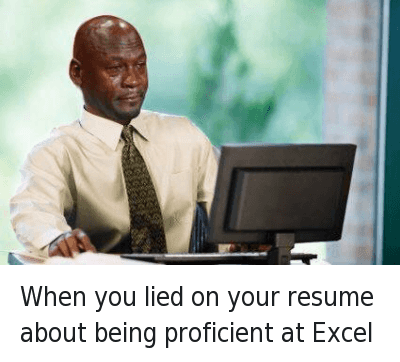
Now you actually might be proficient
Open a clean new spreadsheet in Microsoft Excel, either offline or online (preferred) and start making columns. Use the following for reference:
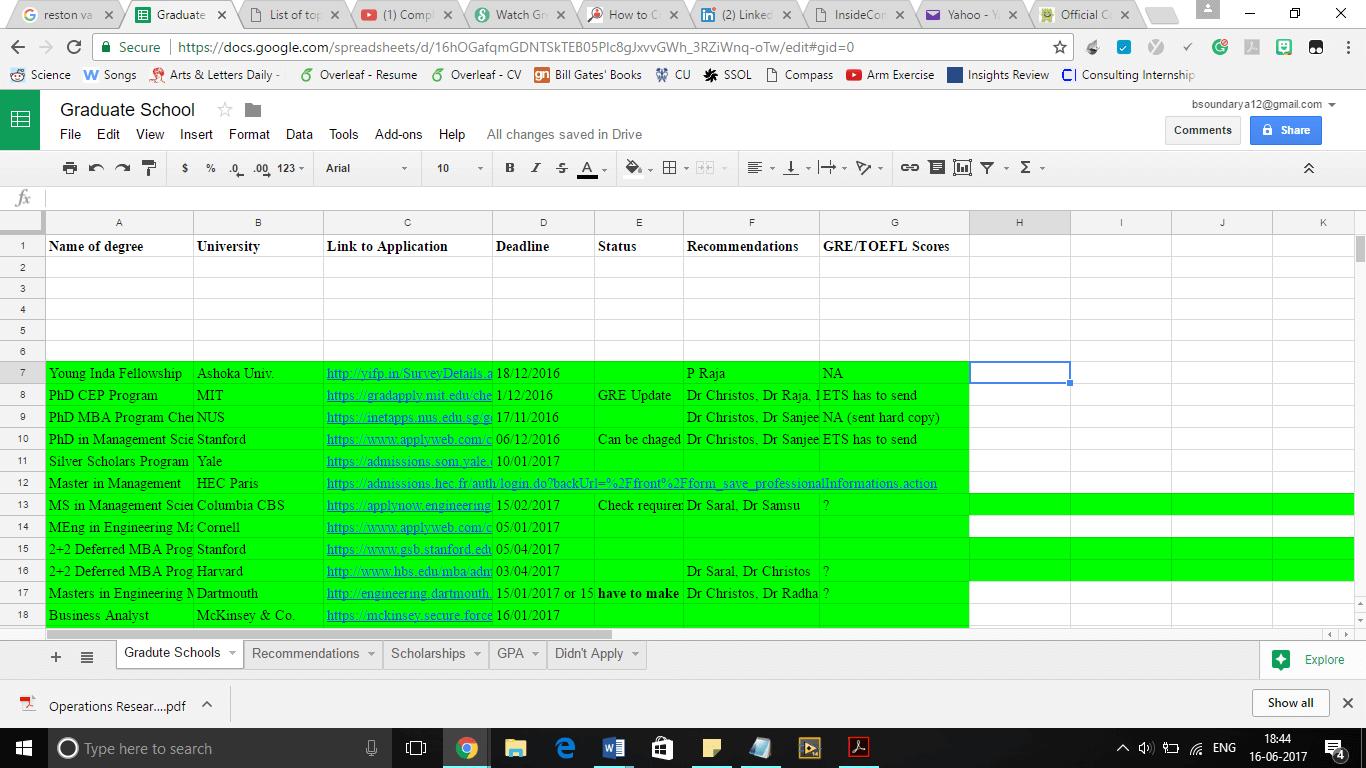
These are must-have columns, add more as you please. The GRE/TOEFL Scores column is to update whether you sent the scores.
Note on preparation for GRE/TOEFL: This requires a separate article as it’s a wide topic. Based on my preparation for both, I’m trying to summarize certain pointers:
- Take a diagnostic test before you start your GRE prep. Take two to be sure. If you obtain less than 300, you definitely need 3 months preparation. If it is 310-320, you can do well with a 2-month prep. For anyone else, I would recommend one month intensive preparation.
- Make use of all the free practise tests online: Princeton, Kaplan, Manhattan, Magoosh, etc. All of them have.
- Take AWA seriously. Every day pick one topic from the ETS’ pool and practise it with someone who has good general knowledge. Look at as many 6/6 answers as you can, they tell you a lot about tricks which you can use to make your essay look good.
- I found the Manhattan 6 test series (30$) helpful as they had adaptive tests and my actual score was very close to what I got there.
- Manhattan 5 lb book has the best math practice out there. If you can solve all the advanced math questions there, you can be sure of 170.
- Don’t neglect the logical reasoning part of RC.
- Remember, GRE has no negative marking and every question has the same weightage. It would be futile to spend more time on any one question.
- TOEFL: It’s pretty easy compared to GRE. One week prep should be fine. Focus more on speaking than anything else, as you get very little time to prepare. Record yourself talking and make your friend listen to it. They can find mistakes which you can’t.
- Finally, whatever score you get, it is circumstantial. It tells nothing. I wrote my GRE twice because I was extremely disappointed with my initial score. I found out where I went wrong after thorough analysis and my second-time score improved drastically.
As soon as you start researching, create this sheet. Updating here should be something you do by default, you should see this screen at least once in a day and always, always keep a reminder on your mobile or laptop at least 5 days before the deadline (It is very easy to lose track of deadlines, speaking from experience). I still remember when I sent an application 2 hours late because of internet problem and ended up becoming paranoid debating if it reached them (It did. Phew). But don’t take the chance.
Another good way to keep track of where you are in your application is to color code the cells. I followed the following code:
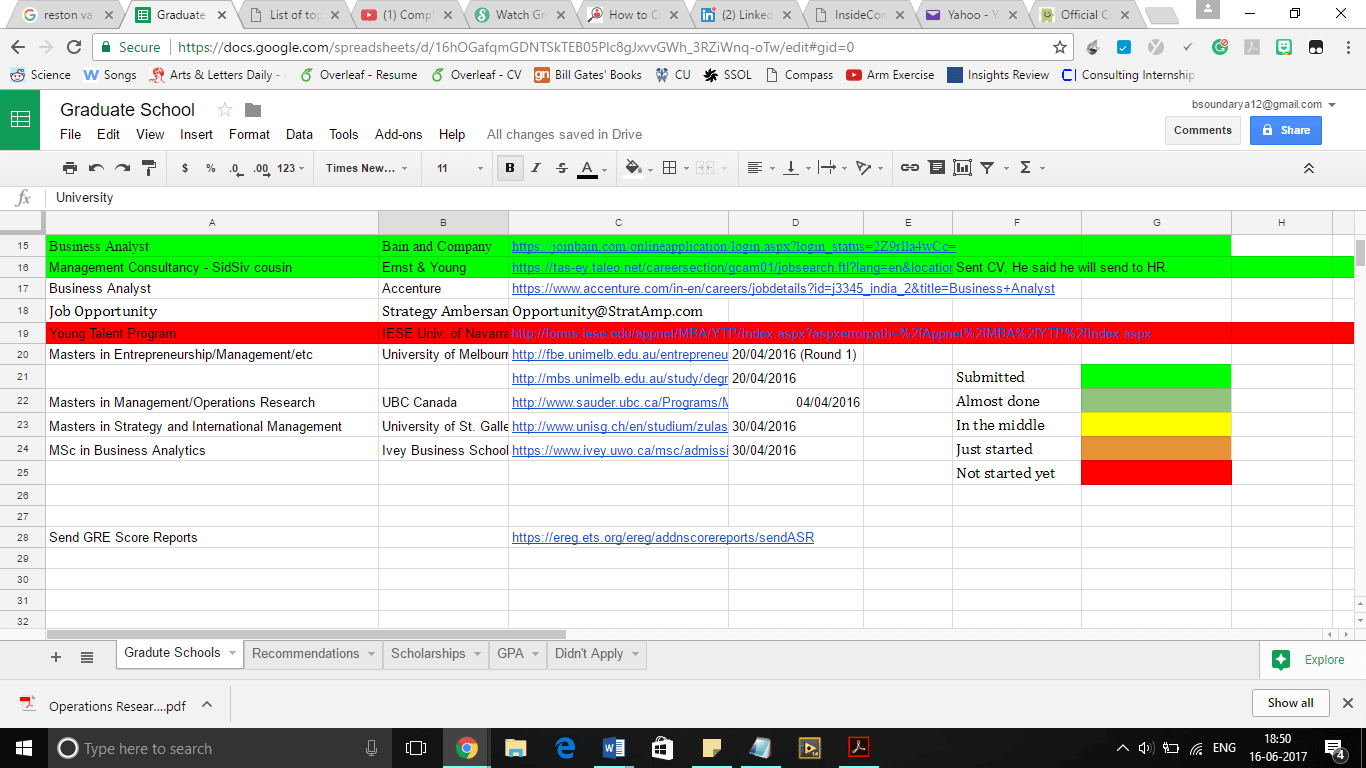
4. Statement of Purpose:
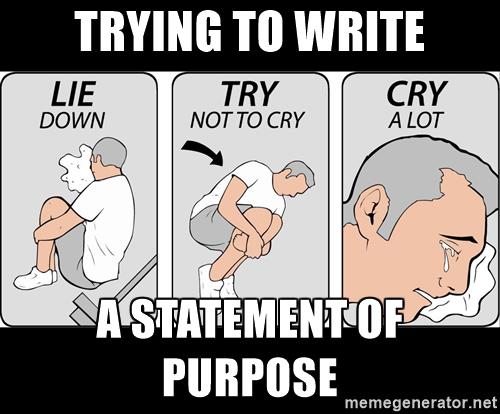
This would be the most frequently heard/said words for you over the next couple of months. People burden this essay with so much pressure that you would always second-guess what you have written. You will hear statements like, ‘SOP is everything man. It has to be perfect’. Let me break it down: It is not everything. It is just one piece of the picture. However, it is the piece that will tell about you most to strangers who read your application. SOP is your chance to tell them your glorious story, to tell them your innermost secrets and convince them why you are indeed unique.
Note: I know a lot of you are worried whether your CGPA is enough or not. It’s not worth the struggle. Whatever it is, if you can show them that you have something else in your application (like SOP, LOR, test scores, achievements) which offsets your perceived low CGPA, it should be fine. However, be realistic while choosing your safe universities.
Do not take it as a burden to write your SOP. This will probably be the only time in your life when you will spend so much time thinking about all that you have done till now. It is a lot of fun, based on how you look at it. That being said, I will summarize in the following points:
- Start writing your SOP right away. This is the perfect time to lay the foundation of the essay.
- A typical SOP should be 1000 – 1200 words, anything more becomes verbose. It can be lesser, but I would suggest you utilize the words well. It’s also subjective to Universities.
- I want you to write your first SOP without looking at any sample. Take this seriously.
- To give you a head-start, follow this rough structure: Childhood inspiration to pursue research, your interests, experiences of internships, any other relevant experience, why that particular University and finally how you stand out. But again, I’d be happy if you forget the above and be creative. Simply tell your life story in a structured and cohesive manner involving facts, anecdotes and examples.
- Once you are done writing the first draft, search online for all kinds of standard samples. I would suggest looking at samples of SOP of students who got into top Universities. Now your job is to start editing and re-writing.
- I remember sending my SOP to over 10 – 15 seniors and peers whose opinion I highly respected. I suggest you do the same: make a list of PhD scholars you worked with, seniors who have guided you and peers who you look up to and start emailing them your SOP. But do not send the first draft to everyone. The first few drafts are just for you to edit, maybe take help from a friend. Only when you reach the fifth or sixth draft, send it to seniors and PhD scholars. They are busy people. To edit an SOP takes ample amount of time, so they wouldn’t want to waste it on a nascent version.
- Finally, take a break. When you feel you reached the final draft, stop it. Don’t look at it for another week. And then go back again and read it from the perspective of a person who reads 500 other SOP’s along with yours. How do you feel? Do you want to change something more?
5. Resume writing. It’s important people!

Too often I see students spending so little time on their Resume writing. It is appalling. Your Resume is your marketing tool, guys! You are basically selling yourself through that one page. No offense to the NIT Training and Placement Resume format (for non-NITTians, it is a 3-page Resume with a very boring outline), but there are hundreds of better formats out there. You want to make full use of that one meagre page (Yes, Resumes are strictly one page) that you are allotted. Students generally tend to make 3 mistakes in Resume writing:
- Use a standard format prescribed for everyone.
- Create a good, yet incomplete Resume. Eg: Missing out on minor details like test scores, skills, etc.
- Despite knowing that you lack somewhere in the Resume, you don’t try to offset it somewhere else. When someone is reading 500 other Resumes along with yours, it’s your job to capture their attention.
So, I hope you will avoid these mistakes.
Note: Some Universities tell you that you can either upload your Resume or CV. In this case, opt for a CV as it gives you the liberty to extend up to 2 pages (Check out the difference online).
LaTex is one of the better softwares out there for Resume making. For those who don’t know how to code well in it (like me), check out . The site has hundreds of templates which are pre-coded. All you have to do is spend 2 hours and edit the information. It will be worth it, trust me. What to include in your Resume: Education, Research Experience, Coursework, Skills (coding and otherwise), Positions of Responsibility and Achievements. What not to include: Parent’s details, GPA of every semester (CGPA is enough), Hobbies, Extra-curricular activities which are irrelevant.
6. Letter of Recommendations a.k.a Professor Hunting:
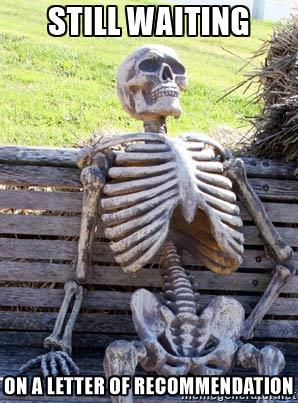
Sigh. So, this is the part where good relationships with your previous project guides and professors will go a long way. If you don’t have any, don’t fret. It’s not too late, yet.
Disclaimer: Every single professor out there knows that you need a recommendation. When you sign up for an internship, they know one of your motive is to get that letter from him/her. Some professors outright mention if they will not be giving any; if they don’t say anything about it, it means they will mostly provide it.
Every application will minimum require LORs from two people: one has to be a person you worked under in an academic setting, the other can either be your employer or again someone from an academic environment. I know you want an LOR badly from that amazing professor you worked under or who taught you. But, take a moment and think from their point of view. I have seen the mailbox of one of my professors, they receive at least 50 mails every week from students asking for LORs. They have their own research work to look after, this will never be their top priority. So, it is not good practise to outright send a mail and ask them for the LOR. First, send a mail giving them an update of what you are doing in life. A few weeks later, send another mail with the list of your shortlisted Universities. I hope they reply by now, so you can go ahead and politely ask if they will provide an LOR and if yes, how many will they provide.
Another Disclaimer: Most professors ask you to write the LOR and send it, don’t be shocked by this. An LOR obviously is a letter flaunting your skills and achievements; now think about how you can make this extra-special. Don’t keep saying, ‘He/She is a mature, intelligent, diligent student’. It adds no value. Instead, write about situations when you handled something from the Professor’s perspective. Don’t be shy to brag about yourself here, modesty won’t help. However, I strongly suggest you not to write it on your own as Universities abroad take this very seriously. Try to convince your prof as much as you can.
Note: Generally, Professors will provide LORs only for 5-6 Universities, in this case you might need to ask at least 4-5 just in case. So, allocate the best professor from your point of view to the dream university. Take some time to do this.
Make another excel sheet to keep track of this. Very, very important.
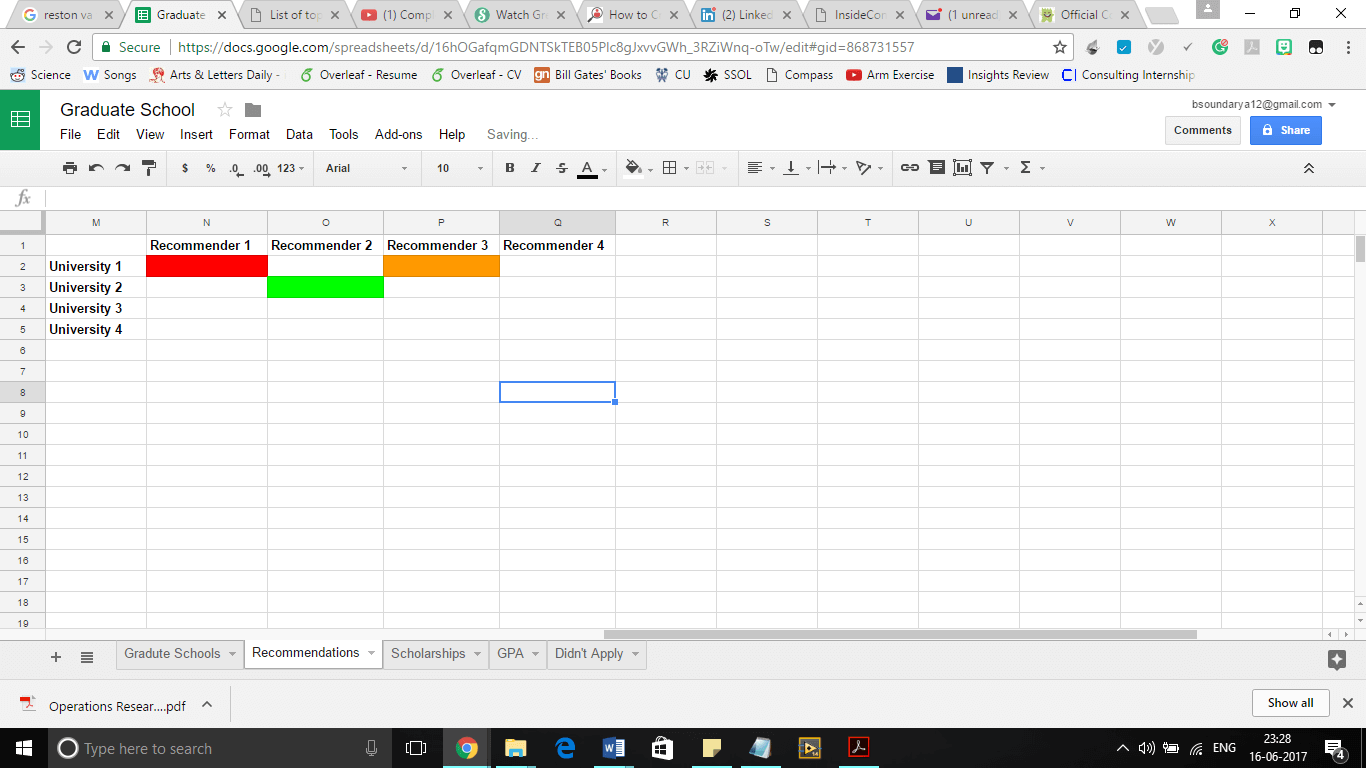
I used the following colour code: Red – Yet to ask, Orange – Asked, but haven’t filled yet, Green – Asked, filled and submitted.
7. It’s interview time.

Let’s jump ahead a few weeks and assume you have applied to a few (or all) colleges you wanted to. Generally, the deadlines start late November and go up to February (or even later). Most colleges have an interview round and I feel they should. Each of you should go through this experience at least once. I’ll keep it short: if you get an interview call, do the following:
- Contact seniors from that University right away, they will definitely recall their experience and give you some tips.
- If you have a week’s time, don’t waste it.
- If the degree is related to engineering: thoroughly read about all of your past internship projects, know exactly what you did and the outcome, learn about the research work in that University, have a clear career plan after the degree and please know world affairs.
- If the degree is related to management (or a mix of management and engineering): Apart from doing the above, I would suggest you know the answer to some basic questions like: What is teamwork? Why I like this certain hobby of mine? What was one instance when my collaboration worked? Again, these are very subjective. If any of you get interview calls from the universities where I applied for the same degree, reach out to me then.
- Login to Skype 30 minutes before the interview. For that last 30 minutes, don’t prepare. Just think about how much work you’ve put in the last few months, play a favorite song in your head and be confident. It’s just another interview.
- Finally, after the interview ends, write down all the questions and answers in word document. This will not only help your juniors, but also yourself for the next interview.
8. The see-saw ride begins:
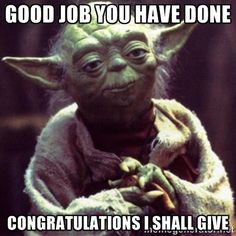
I received 4 out of the 5 rejection e-mails in a span of 5 days. I’m not kidding. At that time, I had no acceptances, so you can imagine how I must have felt. To be honest, I was quite overconfident. I knew I had a good profile so I assumed I would get my safe college (HEC Paris), but I didn’t. I hope you don’t make this mistake. Needless to say, I went into a brief period of depression which I dealt with alone. There are two ways to deal with it: either you silently suffer alone or you share it by taking help from your friends. I did the former but I would recommend you do the latter. There were times when I wished I could go on a trip far, far away. But I had responsibilities to take care of at College, which kept me going. I knew it wasn’t the end of the world, but it was a huge blow. A blow I did not expect. I’m sure you too will go through this phase, at least with one University. Remember this then: One or even ten rejections should not let you down. It doesn’t mean that you are not good enough, it only means you were not a good fit. For them.
I want to say you’ll be fine, but you won’t. Instead, you should feel horrible, you should feel like crying. But, just for a short span. You should not let this hold you back from your everyday works.
That being said, one day you will get a mail with a huge ‘Congratulations’. I still remember the day I got it, the first admit was from Cornell. I remember going out of my room, tears welling up in my eyes, saying to myself, ‘Remember this moment. This is what you were waiting for. Capture this moment’. Amazingly, my next two admits came within a week. An advice I wish you all take to heart: When you get an admit, it does not mean you are better than someone else who didn’t get. Don’t be arrogant, admits don’t tell anything about one’s perseverance and determination in life. It’s okay to feel happy and satisfied, but don’t make someone else feel bad by blowing the trumpet. More than anything, don’t keep asking people if they got an admit. If they did, and if they felt you were important enough to know, they would tell.
9. Kaasu, panam, dhuddu, money, money: (For those who don’t know Tamil, it all means money)

MS in US will rob you of your savings. Let’s assume you did not get a scholarship (which would be mostly the case), how will you sponsor? Apart from using personal savings and loans, everybody wants a scholarship. But the common stereotype is this: ‘Scholarships? It’s a myth man, I won’t get it anyway’. Disclaimer: It’s not a myth.
I am not saying this lightly. I am telling you after 100+ hours of searching online for scholarships. It’s out there. Let me tell it you mathematically. If you put in 100 hours of research, you will definitely be able to find 50+ scholarships which is for Indians, out of that you will be eligible to apply for around 10, out of which you might get shortlisted for 5 and finally obtain 2 or 3.
This happened with me. Out of x number for which I applied, I got shortlisted for 4 whose results will be out shortly. And, I am still applying for more. This should give you an idea of how many are there. I created a database in November 2016 and I’m still adding more and more scholarships to that list. If you have the discipline and diligence to sit and work, you can do it. As simple as that.
Disclaimer: I will not give the database to anyone easily. If you want me to help you, I want you to first put in effort and find some yourself. Once you do that, it would be my pleasure to share the knowledge.
10. You did it. Take a break.

That’s it. You reached the end of the line. After months of writing essays, LORs, Resumes and e-mails, this is where it ends. This is the end of another beginning, another phase in your life. Right now, your job is to tie up all the loose ends. If you got admits from more than one University (assume this is your first preference), politely tell the other Universities ‘no’. Send a long e-mail to all of your professors who gave your LORs. Send an e-mail to every single senior and friend who helped edit your essay. Give a nice party to your close ones. Talk to your parents on call as much as you can. Make a vow to do something to your undergraduate institution, which acted as a stepping stone. Always remember the rejections that kept you going. Try to write down the journey you went through in those few months.
Most importantly, this is when you need to start helping your juniors.
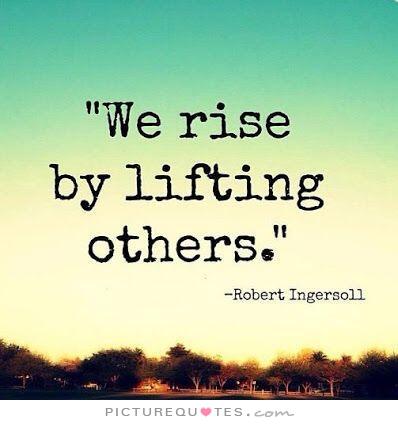
I hope this article was helpful for you in some way. I will be joining Columbia University, New York for my Masters in Management Science and Engineering this fall. I’m planning on writing a series on ‘Life as a Graduate Student’, so that I always remember the next 1.5 years of my life. If you’re interested, you can follow the blog.
P.S. As much as I’d love to answer all of your doubts, I’d also love to know when you get an admit.
P.P.S. For those looking to fast-track their career, you can check out the 2+2 MBA program by Harvard and Stanford. (I did apply, however did not get through the final round)
P.P.P.S (last one, I swear): Just to clear any confusion, my real name is Soundarya Balasubramani. Pooja is a pet name (as well as the Facebook name).
Author: 


























